

9 Argumentative Text Example Articles You Can Confidently Use with Your Third Graders

Searching for good argumentative text examples that are age-appropriate for third graders takes forever. That’s probably one of the reasons there are many argumentative text resources that mistakenly use persuasive picture books as mentor texts.
Let out a sigh of relief because I’ve found some great argumentative articles you can confidently use with your third graders. Now, you can start planning your argumentative text unit before it’s time to pick up your students from specials.
Argumentative Text Example Articles with a Basic Text Structure
These argumentative text example articles are a great way to introduce the genre because they only argue one side, making the author’s claim easier to identify. I suggest starting with at least one of these before moving on to a more complex structure.
In third grade, you can also just stick with this basic structure for your whole argumentative text unit. This is my preferred choice to really make sure students master identifying the author’s claim, audience, and supporting evidence.
1. Let Them Play – FREEBIE from Cultivating Critical Readers
This argumentative essay argues that recess is good for kids. It will easily grab and keep your third graders’ attention as you discuss the structure of the argumentative article. Plus, it’s FREE. Be sure to grab it below.

2 & 3. Are Video Games Good for Kids? and Do You Want Your Kid Playing That? – Paired Set from Cultivating Critical Readers
These two argumentative text examples both use a basic structure to argue opposite points about the same topic. This allows you to continue to develop your students’ understanding of the structure and elements of argumentative text while analyzing the different decisions made by the author in each argument.
Get this paired set here .

4 & 5. The Ultimate Classroom Helpers and Please Don’t Bring That Animal into Your Classroom – Paired Set from Cultivating Critical Readers
This set also pairs two argumentative text examples about the same topic – classroom pets. Each article has a basic argumentative text structure, helping students identify the author’s intended audience, claim, and supporting evidence. Pairing the two together allows for analysis and comparison of how the author supported her argument.
Argumentative Text Example Articles That Argue Both Sides in the Same Passage
These argumentative text examples contain both sides of the argument in one article. I would only move on to this style after your students have a good understanding of the basic structure of an argumentative text.
6. Snooze Alarm – from ReadWorks.org
This argumentative text example discusses the pros and cons of school starting later in the morning so teens can get more sleep.
Read it here: https://www.readworks.org/article/Snooze-Alarm/fb4ed89c-1fb6-4499-9dbb-d92ed9a2b55f#!articleTab:content/
7. A Dodgy Call – from ReadWorks.org
This argumentative article provides arguments both for and against banning dodgeball in school.
Read it here: https://www.readworks.org/article/A-Dodgy-Call/572ce9a9-a027-4fc3-92e0-4246db82b83e#!articleTab:content/
8. Taking Out the Trash Talk? – from ReadWorks.org
Should trash talk be banned in pro sports? Read both sides in this argumentative essay.
Read it here: https://www.readworks.org/article/Taking-Out-the-Trash-Talk/c853e048-1369-4f4b-a6df-41143f02b1b8#!articleTab:content/
9. Fashion Do or Don’t? – from ReadWorks.org
This argumentative text example will engage your students in a discussion about whether students should wear uniforms to school.
Read it here: https://www.readworks.org/article/Fashion-Do-or-Dont/9d0586b4-caf0-4ba6-9b04-8cd504eacf32#!articleTab:content/
Confused as to why you didn’t see The Day the Crayons Quit or the I Wanna Books on this list?
While I absolutely love these books, they belong with your persuasive text unit. Read more here about the differences between persuasive and argumentative texts.
Choose an Argumentative Text Example and Get Started
Choose the structure that best suits your lesson. I like to start with the basic structure that only argues one side to help the students identify the author’s claim. Once your students understand how to identify the author’s claim, intended audience, and supporting evidence, you can move on to the more complicated structure that argues both sides of the coin.
After you’ve chosen a great argumentative text example to use with your third graders, it’s time to get to work planning your unit. Be sure to check out the two blog posts below if you want some guidance as you plan.
Helpful Blog Posts:

Pin It for Later:

I help third and fourth grade RLA teachers like you create engaging and effective reading lessons without all the stress.

Categories:
Affiliate links:, need help teaching figurative language.

Let me help out.
Get my figurative language free interactive notbook, other free resources, ideas, and tips no spam, just things you can use in your classroom., leave a reply cancel reply.
Your email address will not be published. Required fields are marked *
MORE FROM THE BLOG:

7 Vocabulary Activities and Games Your Third Graders Will Love
After reading this list, you’ll have 7 meaningful vocabulary activities and games you can easily add to your vocabulary station tomorrow.


Author’s Purpose Anchor Chart and Free Activity for 3rd Grade
FacebookPinEmailPrint This author’s purpose anchor chart and free activity will help your third and fourth grade students understand that authors

Searching for good argumentative text examples that are age appropriate for third graders takes forever. Here are 9 great argumentative articles you can confidently use with your third graders.

Empowering ELA Teachers: 3 Effective Strategies for Supporting ELL Students
FacebookPin20EmailPrint You may not have been expecting the number of English language learners you have in your elementary classroom. However,

How To Host an Incredible Back to School Night and Impress Your Parents
FacebookPin24EmailPrint Back to school night, meet the teacher night, open house, whatever you call it. It sets the tone for

8 Simple and Fun Icebreaker Games for Kids to Use During Back to School Season
Facebook1Pin21EmailPrint You likely have a thousand things to do to prepare for the first week of school and creating new,
Copyright 2021 | Cultivating Critical Readers, LLC | All Rights Reserved
- Share full article
Advertisement
Supported by
Writing curriculum
Argumentative Writing Unit
Writing prompts, lesson plans, webinars, mentor texts and a culminating contest, all to inspire your students to tell us what matters to them.

By The Learning Network
Unit Overview
On our site, we’ve been offering teenagers ways to tell the world what they think for over 20 years. Our student writing prompt forums encourage them to weigh in on current events and issues daily, while our contests have offered an annual outlet since 2014 for formalizing those opinions into evidence-based essays.
In this unit, we’re bringing together all the resources we’ve developed along the way to help students figure out what they want to say, and how to say it effectively.
Here is what this unit offers, but we would love to hear from both teachers and students if there is more we could include. Let us know in the comments, or by writing to [email protected].
Start With Our Prompts for Argumentative Writing
How young is too young to use social media? Should students get mental health days off from school? Is $1 billion too much money for any one person to have?
These are the kinds of questions we ask every day on our site. In 2017 we published a list of 401 Prompts for Argumentative Writing categorized to provoke thinking on aspects of contemporary life from social media to sports, politics, gender issues and school. In 2021, we followed it up with 300 Questions and Images to Inspire Argument Writing , which catalogs all our argument-focused Student Opinion prompts since then, plus our more accessible Picture Prompts.
Teachers tell us their students love looking at these lists, both to inspire their own writing and to find links to reliable sources about the issues that intrigue them. In fact, every year we get many contest submissions that grow directly out of these questions. Several, like this one , have even gone on to win.
But even if you’re not participating in our argument-writing contest, you might use these prompts to invite the kind of casual, low-stakes writing that can help your students build skills — in developing their voices, making claims and backing them up with solid reasoning and evidence.
And, if your students respond to our most recent prompts by posting comments on our site, they can also practice making arguments for an authentic audience of fellow students from around the world. Each week we choose our favorites to honor in our Current Events Conversation column .
Find Lesson Plans on Every Aspect of Argument Writing
Over the years, we’ve published quite a few lesson plans to support our annual argument writing contests — so many, in fact, that we finally rounded them all up into one easy list.
In “ 10 Ways to Teach Argument-Writing With The New York Times ,” you’ll find resources for:
Exploring the role of a newspaper opinion section
Understanding the difference between fact and opinion
Analyzing the use of rhetorical strategies like ethos, pathos and logos
Working with claims, evidence and counterarguments
Helping students discover the issues that matter to them
Breaking out of the “echo chamber” when researching hot-button issues
Experimenting with visual argument-making
In 2021, we also developed An Argumentative-Writing Unit for Students Doing Remote Learning that can help teenagers guide their own learning.
Teach and Learn With Mentor Texts
You probably already know that you can find arguments to admire — and “writer’s moves” to emulate — all over the Times Opinion section . But have you thought about using the work of our previous Student Editorial Contest winners as mentor texts too?
Here are ways to use both:
Learn from the Op-Ed columnist Nicholas Kristof’s writing process : One edition of our “Annotated by the Author” Mentor Text series is by Mr. Kristof. See what he has to say about the writing challenges he faced in a recent column and how he did the kinds of things students will have to do, too, from fact-checking to fixing grammar errors to balancing storytelling with making a larger point.
Get to know one writer’s rhetorical style : Many teachers use an “adopt a columnist” method, inviting students to focus on the work of one of the Times Opinion columnists to get to know his or her issues and rhetorical style. In 2019, an English teacher in Connecticut wrote for our site about how he does this exercise, in which his students choose from among columnists at The Times, The Washington Post and The Wall Street Journal.
Use the work of teenage winners to help your students identify “writer’s moves” they can borrow: Teachers have told us there is no better way to prepare students to enter our contest than to have them examine the work of previous winners.
On our current site, you can find the essays and letters of the top winners and the runners-up from 2017-2024 . Invite your students to read one and answer the questions we pose in all our Mentor Texts columns : “What do you notice or admire about this piece? What lessons might it have for your writing?” Then, have them borrow one or more of this student’s “writer’s moves” and imitate it in their own work.
We have also published two Learning Network books , one that collects 100 of the best student essays from this contest all in one place, categorized by subjects like “Teenage Life Online,” “Gender and Sexuality” and “Sports and Gaming,” and the other a related teacher’s guide to using them in the classroom.
Here is a roundup of ideas from 17 teachers and students for ways to use these “authentic, powerful and unafraid” student essays in several classroom contexts.
Finally, two new entries in our Annotated by the Author series feature student editorial contest winners from 2020 discussing their work and sharing tips: Ananya Udaygiri on “How Animal Crossing Will Save the World” and Abel John on “Collar the Cat!”
Get Practical Tips From Our Related Videos and Webinars

The video above, “ How to Write an Editorial ,” is only three minutes long, but in it Andy Rosenthal, the former editor of the Times Opinion page, gives students seven great pieces of advice.
Both students and teachers are welcome to watch our popular on-demand 2017 webinar, “ Write to Change the World: Crafting Persuasive Pieces With Help From Nicholas Kristof and the Times Op-Ed Page ,” which includes a wealth of practical tips from Mr. Kristof, as well as from Kabby Hong, a Wisconsin English teacher who works with this contest annually, and his student, Daina Kalnina, whose 2017 essay was one of our top winners that year.
Our guide to writing an open letter provides six steps to help students understand the format and write a powerful open letter of their own — with help from Times texts along the way.
Finally, you can watch our 2021 on-demand webinar, Teaching Argumentative Writing , that focuses on two key steps in the process: finding your argument, and using evidence to support it. You will also get broad overview of how to use our writing prompts and the work of our student winners to help your own students find topics they care about, and craft solid arguments around them. You can also watch an edited version of this webinar below.
Enter Our Student Open Letter Contest
The culmination of this unit? Our Open Letter Contest.
An open letter is a published letter of protest or appeal usually addressed to an individual but intended for the general public. Martin Luther King’s Letter From Birmingham Jail , the recent letter signed by over 1,000 tech leaders about the dangers of A.I. and this funny 2020 letter addressed to Harry and Meghan are all examples of this rich tradition.
Just as we did for our long-running Editorial Contest, we invite students to make an argument in 450 words about something that matters to them, and persuade us that we should care, too. But this time, students must address themselves to a specific target audience or recipient, institution or group — one that has the power to make meaningful change.
Whether students choose their parents, teachers, school board members or mayor; a member of Congress; the head of a corporation; or a metonym like “Silicon Valley” or “The Kremlin,” they should ask themselves, What do I care about? Who can make changes, big or small, local or global, to address my issue or problem? What specifically do I want them to understand and do? And how can I write this as an “open letter,” meaningful not just to me and the recipient, but to a general audience?
Here are the rules and guidelines for our Open Letters Contest as well as links to winning letters written by students .
As always, all student work will be read by our staff, volunteers from the Times Opinion section, and/or by educators from around the country. Winners will have their work published on our site and, perhaps, in the print New York Times.
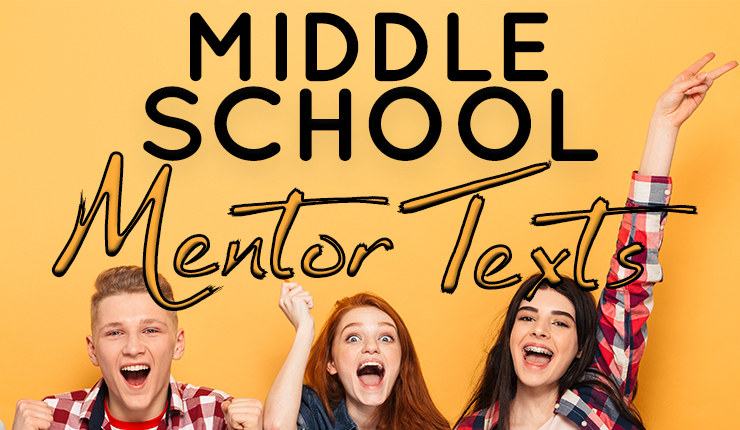
Note: This article doesn’t cover how to teach using mentor texts. Read how to use mentor texts here .
Help make this article a more powerful resource for teachers by sharing your favorite mentor texts in the comments at the end.
Table of Contents:
Personal Narrative Memoir Fiction Informative Literary Analysis Argumentative Speech
Personal Narrative
Eleven by Sandra Cisneros Best for 6th Grade
It’s Rachel’s eleventh birthday but she doesn’t feel eleven. On this day she feels more like one. Her insensitive teacher wants to find the owner of a red sweater that’s been sitting in the coatroom for a very, very long time. No one in Rachel’s class wants to claim it. When Rachel is accused she doesn’t speak up for herself. The following writing skills are beautifully done in this short story:
- Descriptive Language
- Figurative Language
- Inner Thinking
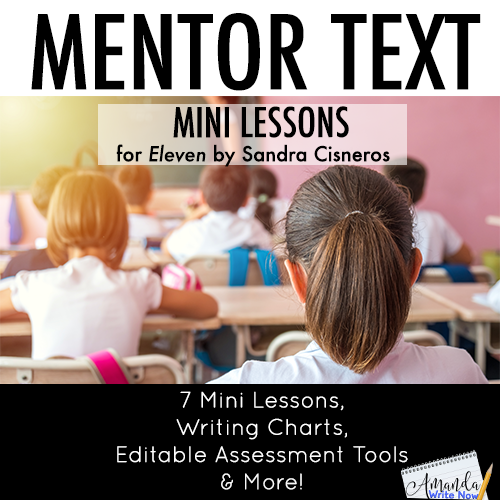
Everything Will be Okay by James Howe Appropriate for Grades 6-8 (very sad though)
James finds a sick kitten in the woods and tells the kitten everything will be okay. He takes it home hoping his his family will help. His mother says, “we’ll see…”. His brother Paul, who works for Dr. Milk, comes home and knows what to do. They drive the sickly kitten over to the vet’s office and the scenes that follow are heart wrenching. This story flows back and forth between the events of this day and memories involving James’s family. These components of narrative writing stand out most in the story:
- Building Tension
- Character Development
- Past and Present Transitions
First French Kiss by Adam Bagdasarian Best for 8th Grade
Will is in sixth grade and invited to Maggie’s party. He and Maggie have been exchanging notes in class. She confessed she liked him better than two other boys. Will gets ready for the party and has high hopes for the night. He and Maggie slow dance and afterward Will gets pressure from his friends to french kiss Maggie. When I read this story out loud to my students they are anything but disengaged. This story is related in so many ways. The following writing skills could easily be taught using this mentor text:
Out of Bounds by Amanda Werner Appropriate for Grades 6-8
My husband and I lived in Salt Lake City, Utah for five years and bought season ski passes every year we were there. We spent most weekends in the Wasatch mountains skiing the greatest snow on Earth. As fantastic as this sounds, things went very wrong one day. Erik, my husband wanted to ski out of bounds. We’d done so before and nothing had gone wrong but every time we did it I struggled with a decision, follow my husband out of bounds or stick to the groomers. On this day, I chose to follow and things went seriously wrong. The following writing skills could be taught using this short story:
What’s the difference between memoir and personal narrative? Memoirs are usually centered on a time period in a person’s life, or a theme, whereas personal narratives are about one important event. The memoirs below are powerful stories about facing both small issues and huge. Your students will find connections and ideas from reading these:
Fish Cheeks by Amy Tan Best for 8th Grade
Amy Tan is in love at the age of 14 with a boy named Robert. He doesn’t know it. To her horror, his family is invited over to dinner for Thanksgiving. Amy is mortified by her family and their traditional Chinese ways. This story is so short but is packed with wonderful writing lessons about the following topics:
- Setting Description
- Reflective Ending
The Jacket by Gary Soto Appropriate for Grades 6-8
Gary needs a new coat. He describes a super cool biker jacket to his mom and is excited by the potential this new piece of clothing could have on his identity. The next day he finds a guacamole colored, too large coat hanging from is bedpost. His mom says it’s for him. He wears the ugly thing for years and describes in sad detail the negative impact it had on his life and his eventual acceptance of the thing and his situation.
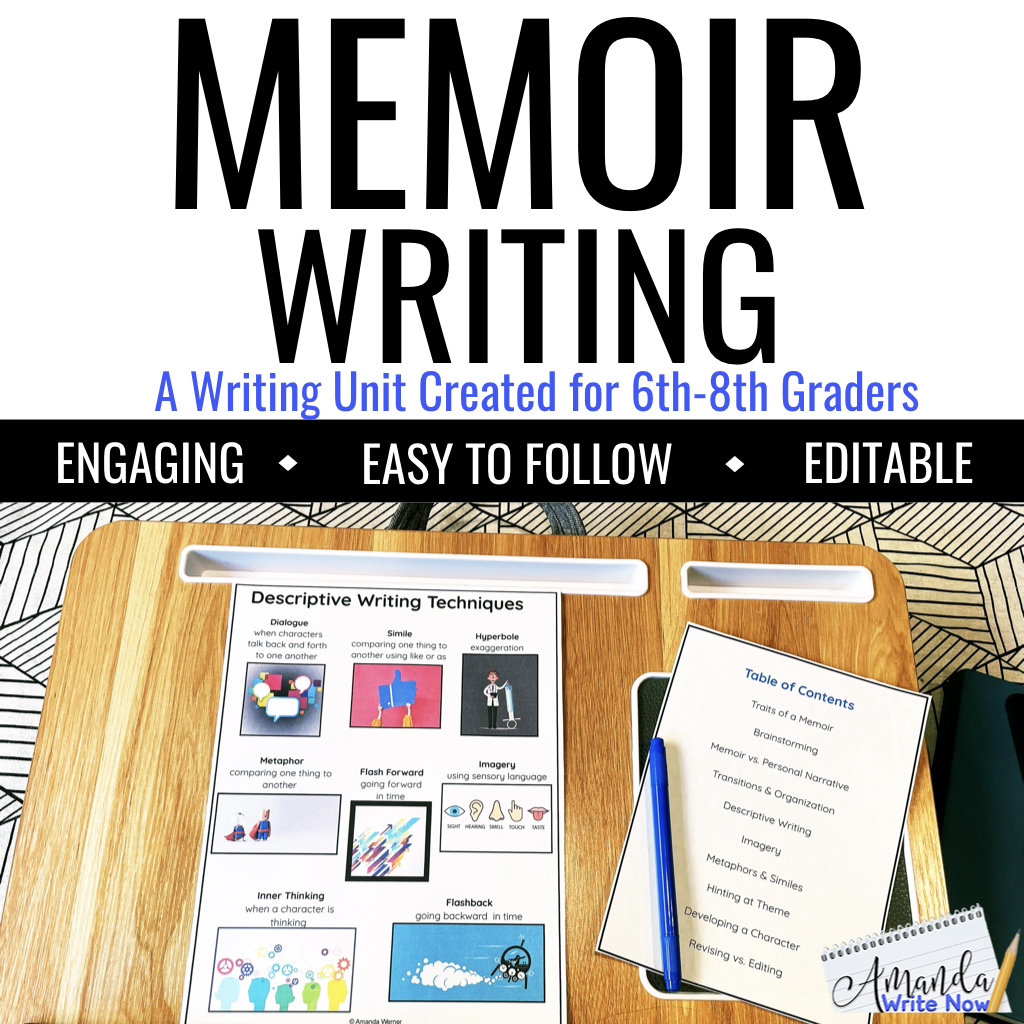
Superman and Me by Sherman Alexie Best for 8th Grade
Alexie describes his love of reading from the age of three to adulthood. He knows this love of reading saved him from the poverty and struggles of life on an Indian Reservation. But he doesn’t just want to save his own life, he wants to save others’ lives too, through books and writing.
Two Kinds by Amy Tan Best for 8th Grade
Jing-mei’s mom has big plans for her daughter. She wants her daughter to be a prodigy. But as time goes on and Jing-mei fails her mother’s expectations over and over, Jing-mei begins to resent her mother and fail on purpose. She and her mother eventually face off and Jing-mei wins. Her mother backs off, but eventually Jing-mei regrets what she did and the things she said to her mother that day.
- Transitions
I believe that most teachers neglect teaching fiction writing because it is a beast! Fiction includes many, many genres and trying to teach how to write all those genres seems daunting. It is daunting! Here’s what I suggest…let students choose the genre and teach core writing skills that apply to all of them. Those core skills might be: plot, character development, setting, tone, mood, point of view, description, dialogue, theme, figurative language, transitions, organization and the writing process.
But what about mentor texts? You can do one of two things: use short excerpts from your favorite fictional books or use short stories. Below are some of my favorite fictional short stories. I think most English teachers use these stories to teach reading analysis, but fictional writing skills can be taught with these stories too!
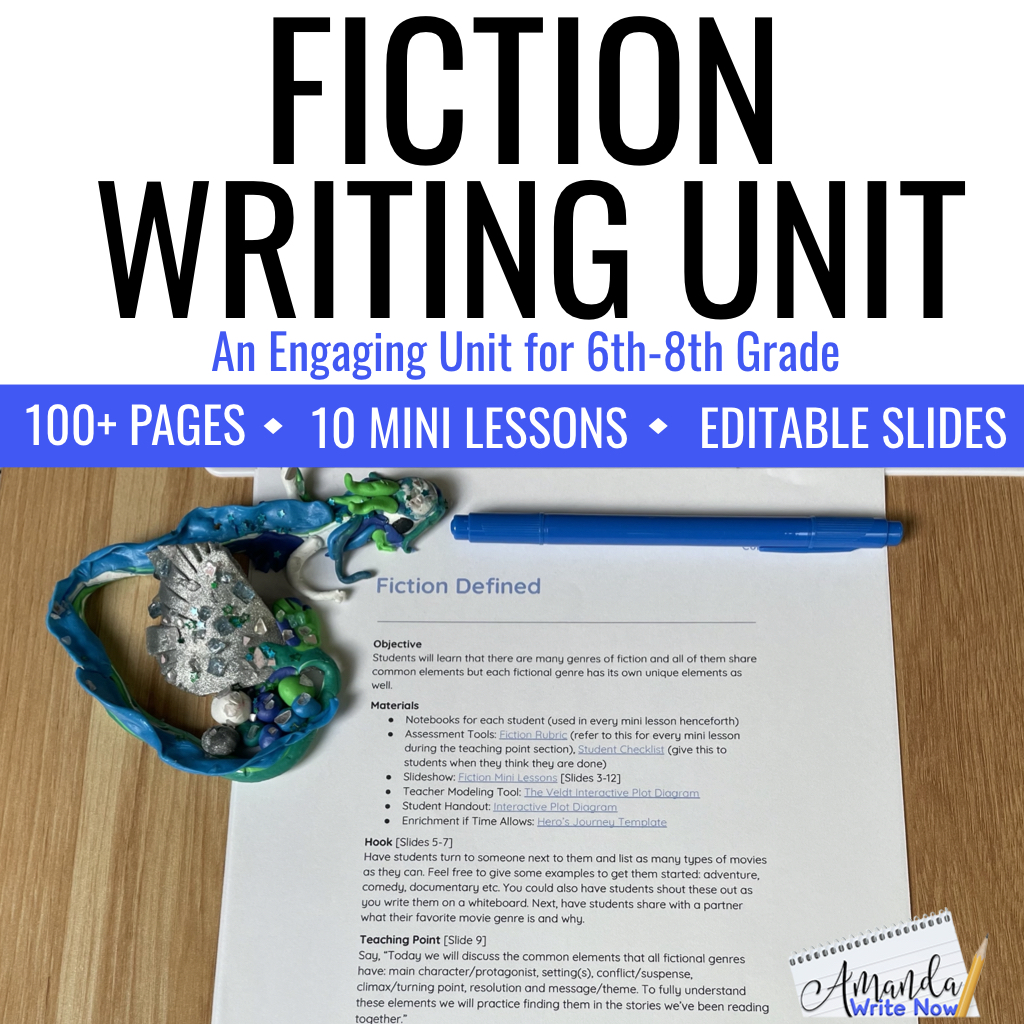
All Summer in a Day by Ray Bradbury Appropriate for Grades 6-8
Margot is from planet Earth and just moved to Venus. Most children in her class have never seen the sun, because on Venus it rains for seven years straight. On the day that the rain is finally supposed to stop the kids in Margot’s class make a horrendously cruel decision. The following fictional writing skills are very obvious in this classic sci-fi story:
Thank You Ma’am by Langston Hughes Appropriate for Grades 6-8
Mrs. Jones is walking through the street at night when suddenly a young boy tries to take her purse. She is a strong women and grabs a hold of the boy and doesn’t let go. Instead she brings him to her house, feeds him and talks to him. She learns his name is Roger and soon they begin to develop an understanding. This very short story is packed with writing lessons, here are some of the more obvious ones:
The Paper Menagerie by Ken Liu Best for 8th Grade (has mature content)
Jack or “Kan-kan”, as his mother likes to call him, has a magical, paper lion named Laohu. Jack’s mother made it for him. She has an incredible talent for making origami creatures come to life. Jack loves all his “pets”, but when another boy comes over with his Star Wars toys, Jack realizes he is different…and even more so…his mother is different. He begins to keep his distance from his mother and wants her to be more American by learning English. Jack stops speaking Chinese with her and as time goes on he discovers the story behind his mother’s past. This story is worth a read by you and your students! Here are some writing skills you could teach using it:
- Dialogue & Inner Thinking
- Integrating Historical Time Periods & Events into Stories
- Formats/Letters as Part of Stories
The Veldt by Ray Bradbury Appropriate for Grades 6-8
George and Lydia Hadley just purchased the HappyLife Home. This house does absolutely everything you can think of for them and their two children. It even has a playroom that can turn into the African savannah for their children’s entertainment. Lack of discipline and too much reliance on technology leads to a treacherous end. There are so many awesome writing techniques used in this story:
- Ending with a Twist
The Lottery by Shirley Jackson Appropriate for 8th Grade
Members of a small village gather for many events throughout the year, square dances, teen club, the Halloween fair and other civic activities. And now all the members of this small town, men, women and children gather for the annual lottery. This dark story has many writing techniques that students can emulate in their own fictional stories:
- Foreshadowing
Informative
It is fairly easy to find information mentor texts, they are all over the internet in the form of blog posts and news articles. Tween Tribune and Dogo News are my favorite free websites for informational writing mentor texts. They always have articles that interest students. Kelly Gallagher also has a comprehensive list of both information and argumentative articles all formatted to use in your classroom: Articles of the Week . Gallagher uses these articles in his high School English classes, so they are more advanced, however, access to all of these articles in one place can be super helpful for an 8th grade teacher like myself and maybe you too.
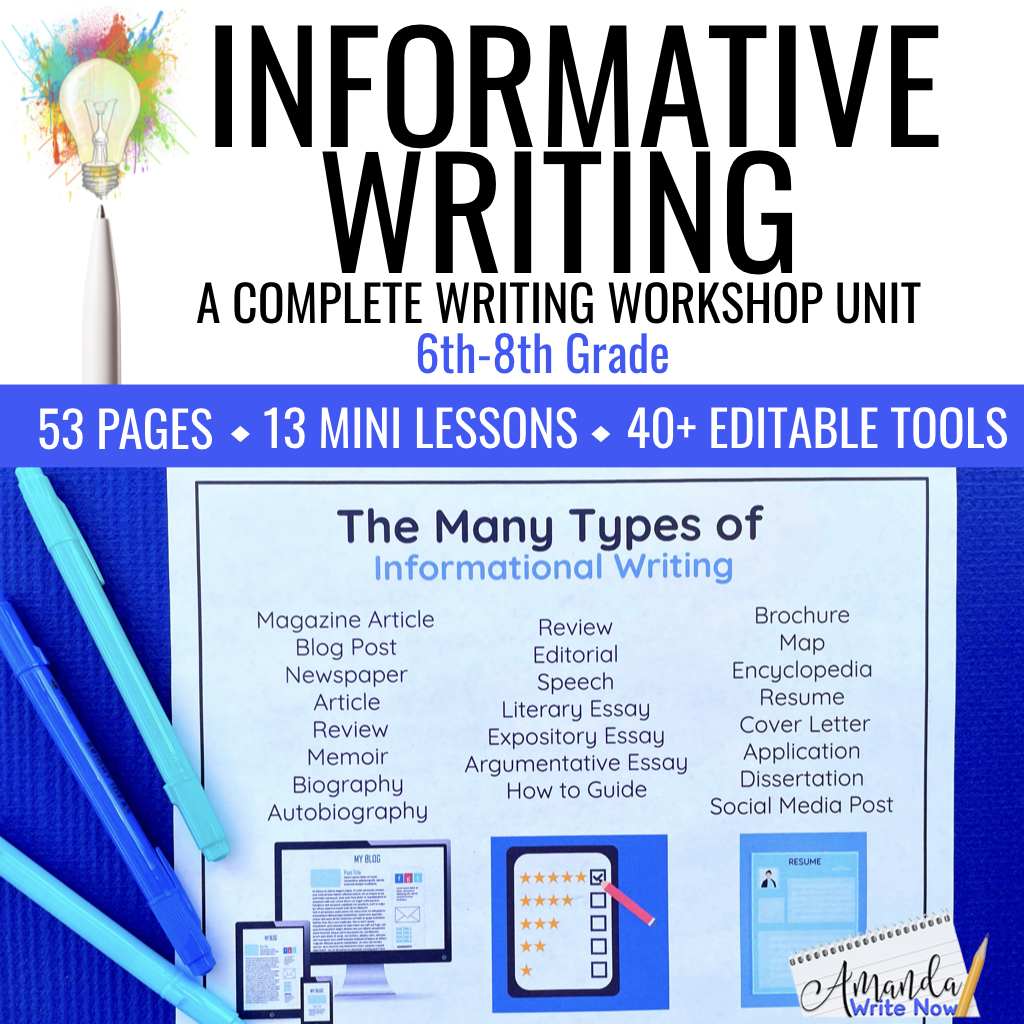
Teens and adults say they feel tethered to their phones from Tween Tribune Appropriate for Grades 6-8
Parents are depicted as a bit hypocritical in this article (students will love it). They say they want their children to use their devices less. Yet, parents seem to be on their devices just as much, if not more than their children!
- Citing Studies
- Quoting Sources
How Online Gaming Platform Roblox is Helping Teenagers Become Millionaires from Dogo News Appropriate for Grades 6-8
Kids can become developers for games like Roblox. The company pays 30% in royalties and this has made some millionaires! Students will love reading about how to make money through what they are most passionate about…video games!
- Citing Data
- Organization
Homework and Tests Stressing You Out? Consider Moving to Sweden from Dogo News Appropriate for Grades 6-8
A school in Sweden decided to do an experiment…no homework or tests for a whole month. If stress is reduced in these students’ lives they may never have to do homework again! Other countries are experimenting with this idea too. Students will love learning about the negative impacts of homework in this article. Here are some of the features of this article students could emulate in their own informational writing:
- Bias (this article is a bit one-sided)
- Summarizing Studies
- Embedding Video
Giant boom hopes to corral Pacific Ocean’s plastic trash from Tween Tribune Appropriate for Grades 6-8
Between Hawaii and California there floats a patch of trash twice the size of Texas! It is disgusting. Boyan Slat, a 23 year old, has taken it upon himself to find a solution. This article talks about his invention and how he is working toward a solution to this very large and concerning problem. Here are some writing skills students can glean from reading this informative article:
- Embedding Quotes from Interviews
- Providing Differing Viewpoints
- Providing Statistics
- Use of Commas to Add Detail
Literary Analysis
Ever wonder why it is so difficult to find mentor texts to teach literary essays? It’s because people don’t write literary essays in the real world! The only time this type of writing is done is in school. This worries me a bit because I believe students should be writing what people in the real world write. Then, I came across this article called, Thinking About Mentor Texts for Literary Analysis , and was convinced that yes we should definitely still teach literary essays. Not because it is what we’ve always done in English classes, our reason should be to help students develop their analysis skills so that they can think critically about world events, business, politics, books and even their own lives! The mentor texts below are about a wide range of topics but can still be used to teach literary essay writing skills.
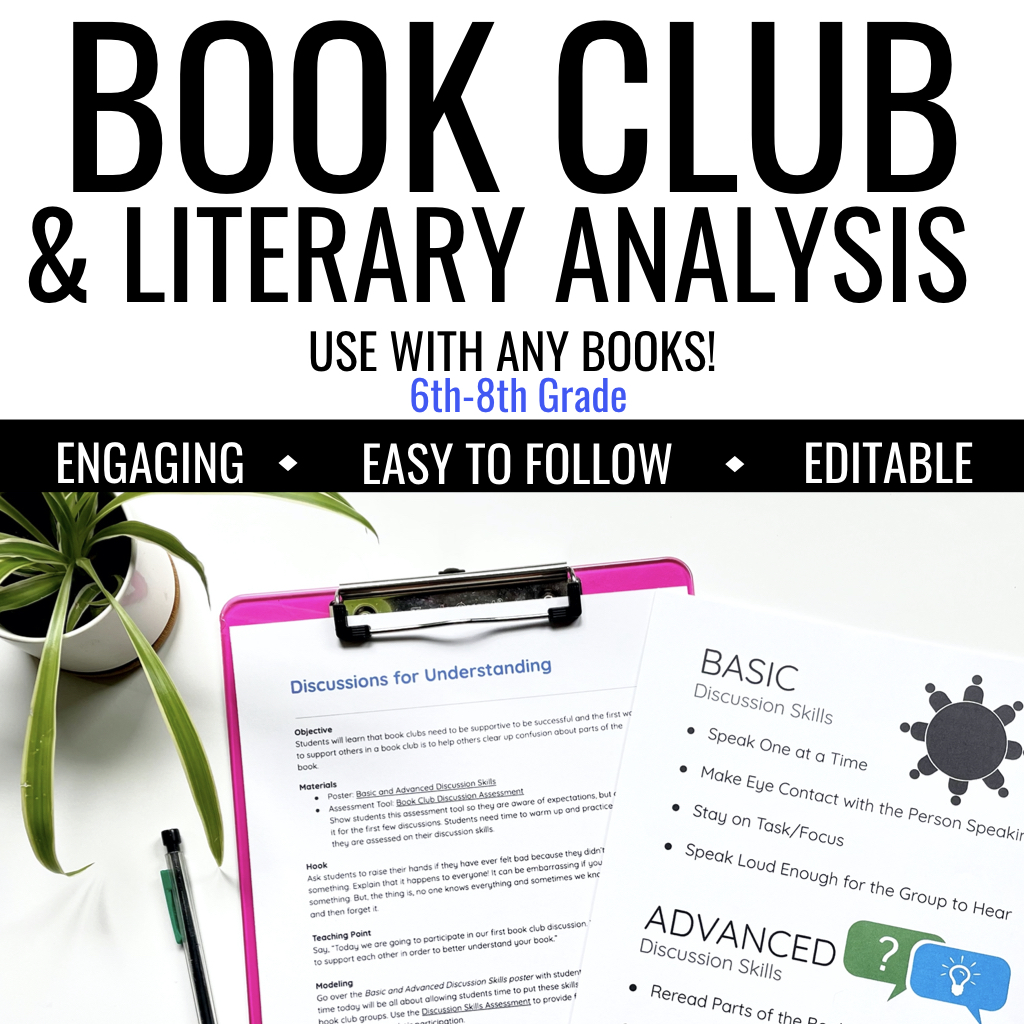
Picture Books Tell Children the Harsh Story of Refugee Picture Books by Monica Edingar Appropriate for 8th Grade (advanced writing)
Edingar starts off arguing how important it is that we talk about the experiences of migrants and refugees, especially to our children. She then goes on to beautifully summarize and analyze six children’s books about people from places ranging from Chile to Greece to Mexico. Students could learn these writing techniques from reading all or part of this article:
- Quoting Individuals
- Summarizing
YA Thrillers to Give You Chills This Summer by Elisabeth Egan Appropriate for 8th Grade
Three thriller YA novels are discussed in this well written article. Not only will students learn the writing techniques listed below, they’ll also learn about some high interest YA novels too.
- Comparing Literature
- Making Connections
- Narrative Hook
- Providing Details in Parentheses
10 Benefits of Reading Everyday by Lana Winter-Hebert Appropriate for Grades 6-8
This article discusses some excellent reasons why we should be reading everyday. Many important points are brought up such as how reading helps you become a better writer and develop analytical skills! The following writing techniques could be taught using this article:
- Hooking Reader with Questions about Their Life
- Providing Photo Credit
Movie theaters fight streaming by assaulting the senses Appropriate for Grades 6-8
Movie theaters are struggling to compete with the streaming television services Netflix and Amazon Prime. So, they are adding many creative features to keep movie goers coming back. Reclining seats, food service and even augmented reality! There are many things to learn from this article:
- Using Dashes to Add Extra Detail
- Word Choice
Argumentative
Finding age appropriate argumentative writing samples that are at the middle school level is tricky. I rely heavily on newspaper editorials. This is real life argumentative writing at its finest. However, newspapers are often written above our students’ reading levels. Because of this fact I read these articles out loud with students first read then I have them reread and annotate. It is more likely students will retain the information and the writing skills you teach when you read it out loud first. Then, on a different day during your argumentative writing unit, analyze parts of the articles pointing out skills you want to teach that day.
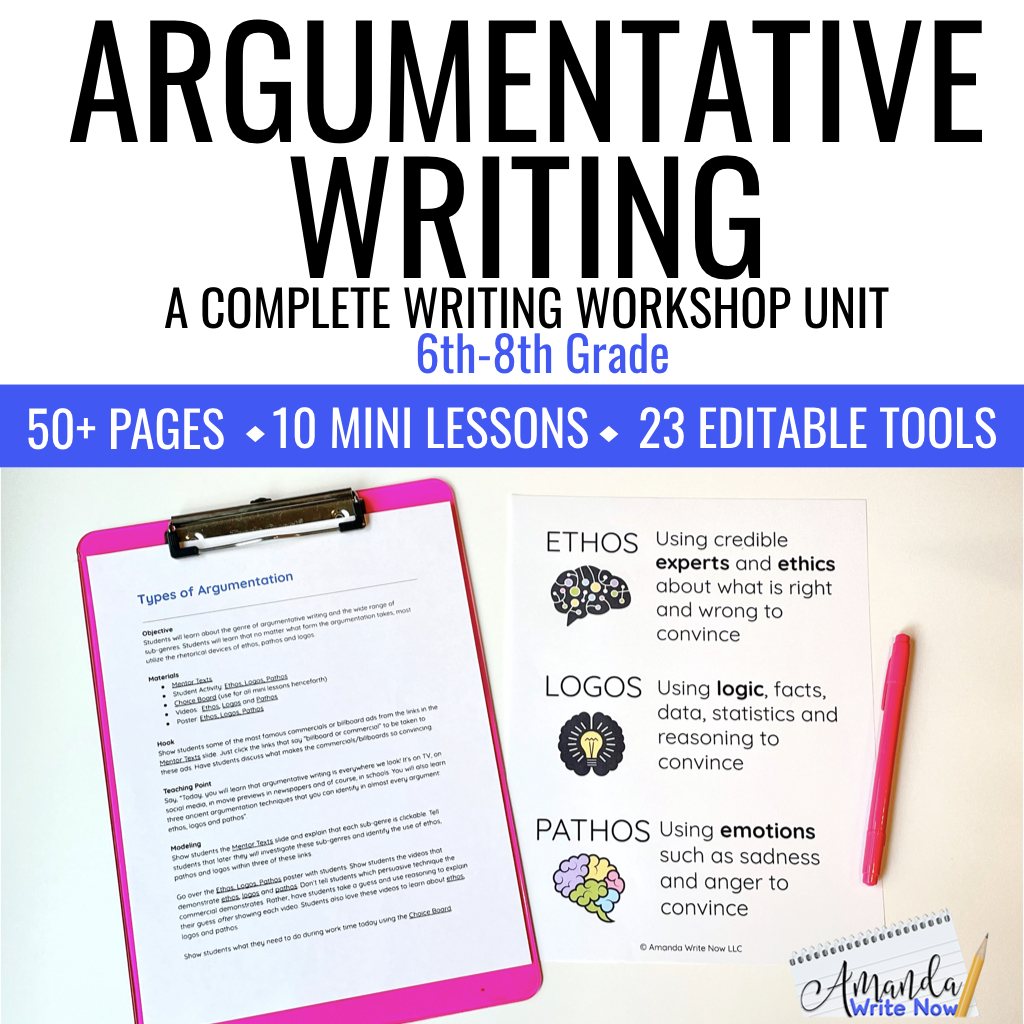
Attention, Students: Put Your Laptops Away by James Doubek Appropriate for Grades 7-8 (article is a bit advanced)
Doubek argues that taking notes by hand is actually better than taking notes on a laptop. When you take notes by hand you synthesize information into memorable chunks because you can’t write absolutely everything down when a teacher is lecturing. When you take notes using a laptop you tend to type word for word what you hear, skipping the important synthesis and thinking process. Not only is this an important article for students to read, you can also teach the below writing skills using the article too.
- Connecting to Audience in Hook
- Making Counterarguments
- Quoting Interviews
The Big Myth About Teenage Anxiety by Richard A. Friedman Appropriate for 8th Grade (term sex is used)
Friedman is a psychiatrist and argues that screens are not causing a rise in psychological disorders like anxiety and depression. Studies done about the impact on screens to our mental health only show correlations and not causation. He argues that anxiety and stress are a normal part of everyday life and parents need to stop assuming it is psychological trauma. This article has all sorts of argumentative writing techniques students can learn from:
- Counterarguments
- Dashes to Include More Detail
An Open Letter About Female Coaches by Pau Gasol Best for 8th Grade (some locker room talk)
Pau Gasol is an NBA basketball player who has been coached by Becky Hammon, the first and only female to ever coach in the NBA. Paul writes this letter to question societal norms and assumptions about women in positions that are dominated by men. It is an excellent read. Here are some skills you could teach using this article:
- Setting Sentences off to Emphasize
Is it Actually Smart to Sit Still? by Hannah Amell
Hannah Amell is a 15 year old New York Times Learning Network essay finalist. Find out more about the contests here: Learning Network Contests. She wrote her editorial arguing against block schedules. She thinks schools need to start incorporating more movement in their classrooms. Here are some writing techniques she used:
- Connecting with Audience in Hook
- Incorporating Interviews
- Sentence Variety
- Ending with a Question
Thanks to TED Talks (and the transcripts that are provided right beneath them), there are tons and tons of examples of speeches available online for our students. I believe this is why so many teachers are shifting from having students give speeches to having their own TED Talks! If you do this have students watch some talks, read the transcripts and then begin planning their own. Here are my favorite TED Talks to show students:
Overcoming Obstacles [ Transcript ] by Stephen Claunch Appropriate for All Grades
Stephen Claunch was born with many health issues. But these issues have not stopped him from reaching his goals. Stephen explains that obstacles can be overcome with hard work, not excuses. There are multiple heartwarming stories and lessons students need to learn in this talk!
- Weaving Multiple Stories Together
How to Start a Movement [ Transcript ] by Derek Sivers Appropriate for All Grades
This humorous talk analyzes the process of creating a movement. Sivers points out that leaders are important but followers might be more important to making a movement. Here are some speech writing topics you can cover with this talk:
- Summary of Lessons to End Speech
- Using Humor
- Video Analysis in a Speech
8 Secrets to Success [ Transcript ] by Richard St. John Appropriate for Grade 8 (the words damn and assholes are used)
This super concise and funny talk gives students advice for how to be successful in life. Here are some speech writing techniques you can teach with this talk:
- Acronyms to Teach
- Listing as a Way to Organize a Speech
- Slideshow Graphics
How to Tie Your Shoes [ Transcript ] by Terry Moore Appropriate for All Grades
This short talk teaches us that we’ve been tying our shoes wrong! It is eye-opening in the simplest way. Here are a few speech writing techniques you can teach with this talk:
- Connecting with the Audience
- Doing a Demonstration During a Speech
- Using a Quote to End a Speech
Type your favorite mentor texts in the comments below…
Related Articles:
How I Teach Reading and Writing Workshop in 54 Minutes
10 Best YouTube Channels for Writing Teachers
11 Comments
This is soooo helpful! Thank you so much for sharing!
Thanks Lyndsey! I’m so happy that you found this article helpful! I appreciate you taking the time to let me know:)
This post is absolute gold, Amanda! Finding good mentor texts is the biggest time-suck, and this post saves sooo much time. Thank you so much for putting it together!
Thank you so much for the wonderful feedback on this article Jeanne! It means so much to me:)
Thank you! This is so helpful! I just shared this page w/teachers in a Twitter chat about mentor texts. I appreciate it! 🙂
Tara, thanks for taking the time to comment and share:) I appreciate YOU!
Thanks you so much for all of the valuable resources and information! Can you please advise/ explain how you incorporate grammar lessons? Thank you SO much!
Hi Gina, I teach grammar as needed during conferences to students who need specific instruction because of glaring mistakes they are making over and over again. I rarely teach grammar lessons to the whole class because I honestly don’t feel my students benefit from knowing grammar terms. Their writing improves the more they read and write not the more they do grammar exercises. I hope that answers your question:)
I wish there was a section with historical fiction. I find historical fiction very interesting and it’d be very helpful right now for my assignment from class.
Great idea! My favorites are Chains by Laurie Halse Anderson, Blood on the River by Elisa Carbone, The Book Thief by Markus Zusak, All the Light We Cannot See by Anthony Doerr and I could go on. Historical Fiction is probably my favorite genre to read. Writing historical fiction brings a whole other challenge! What are your favorite historical fiction books?
The Lorax is great for teaching argument.
Submit a Comment Cancel reply
Your email address will not be published. Required fields are marked *
Submit Comment
